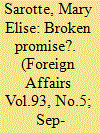| Srl | Item |
| 1 |
ID:
133666


|
|
|
|
|
| Publication |
2014.
|
| Summary/Abstract |
Moscow has long argued that in expanding NATO eastward, Washington broke the promise it made to Soviet leaders shortly after the Berlin wall fell. But new evidence shows that the United States never actually made such a pledge.
|
|
|
|
|
|
|
|
|
|
|
|
|
|
|
|
| 2 |
ID:
095520


|
|
|
|
|
| Publication |
2010.
|
| Summary/Abstract |
One of the biggest sources of tension between the United States and Russia today is the enlargement of the North Atlantic Treaty Organization (NATO), to countries that were either Moscow's allies in the Warsaw Pact or part of the Soviet Union itself. During the Cold War, Leningrad was roughly twelve hundred miles away from the edge of NATO; now (as St. Petersburg) it is less than a hundred, thanks to the membership of Estonia.1 Present-day Russian officials insist that the United States, by enabling and supporting this expansion, has broken promises made during the era of the George H. W. Bush presidency and German unification, when the Soviet Union came to an end.
|
|
|
|
|
|
|
|
|
|
|
|
|
|
|
|
| 3 |
ID:
097757


|
|
|
|
|
| Publication |
2010.
|
| Summary/Abstract |
Washington and Bonn pursued a shared strategy of perpetuating U.S. preeminence in European security after the end of the Cold War. As multilingual evidence shows, they did so primarily by shielding the North Atlantic Treaty Organization (NATO) from potential competitors during an era of dramatic change in Europe. In particular, the United States and West Germany made skillful use in 1990 of Soviet leader Mikhail Gorbachev's political weakness and his willingness to prioritize his country's financial woes over security concerns. Washington and Bonn decided "to bribe the Soviets out," as then Deputy National Security Adviser Robert Gates phrased it, and to move NATO eastward. The goal was to establish NATO as the main post-Cold War security institution before alternative structures could arise and potentially diminish U.S. influence. Admirers of a muscular U.S. foreign policy and of NATO will view this strategy as sound; critics will note that it alienated Russia and made NATO's later expansion possible. Either way, this finding challenges the scholarly view that the United States sought to integrate its former superpower enemy into postconflict structures after the end of the Cold War.
|
|
|
|
|
|
|
|
|
|
|
|
|
|
|
|
| 4 |
ID:
066361


|
|
|
| 5 |
ID:
086316


|
|
|
|
|
| Publication |
2008.
|
| Summary/Abstract |
Any nuanced assessment of current transatlantic tensions requires an awareness of their historical context. An understanding of the legacy of the Cold War in particular helps to answer the following questions: (1) What are the sources of current US-European tensions? (2) Has the transatlantic connection sustained mortal damage, or can it endure? (3) What changes of attitude and of focus might help the transatlantic relationship in the future? The argument is as follows: The US-European relationship is under assault not just because of recent US military actions but also because of a longer-term shift away from a successful US Cold War grand strategy that still had much to offer the post-Cold War world. However, cause for alarm is limited, because the history of cooperation, the lack of alternative partners, and the very real nature of external threats means that neither the US nor the Europeans have any realistic alternative to cooperation with each other.
|
|
|
|
|
|
|
|
|
|
|
|
|
|
|
|